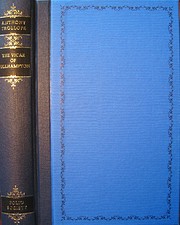

Pulse en una miniatura para ir a Google Books.
|
Cargando... The Vicar of Bullhampton (1870)por Anthony Trollope
 Ninguno Actualmente no hay Conversaciones sobre este libro.   ) )Mary Lowther refuses to marry Frank Gilmore because she does not love him and then almost immediately meets, falls in love with and becomes engaged to her cousin Walter. This engagement has to be broken off when Walter's father leaves him penniless. Broken-hearted, Mary agrees to marry Frank, reasoning that this will make him happy, but she does so explaining clearly to him that she can never love him. Readers of Trollope's other novels will realize that this is a big no-no. There is a second story concerning the murder of a farmer for which Sam Brattle, the miller's son, comes under suspicion. Sam has a sister, Carry, who is described in the blurb on the back of my edition as "a prostitute" although (and it is hard to be sure as Trollope is forced to tread lightly here) it seems to me that she has merely slept with men who promised to marry her and then abandoned her. Trollope is very good here at examining the reactions of various members of the community to her. Carry is universally condemned (and the men who promised to marry her are punished only by her family) as evil and untouchable, even as the (Christian) community pays lip-service to the concepts of forgiveness, all sins being equivalent and above all redemption. Even Fenwick, the vicar, whose attitude is most truly Christian and who presumably speaks for Trollope here, feels that a reform home would be the best place for her if her family will not take her back and seems doubtful that Carry will be happy with a normal humdrum life (after the "excitement" of sex outside marriage). The story of the dissenting chapel built outside the vicarage gates was entertaining and I liked Mary and sympathized with her decisions. Frank Gilmore's character was very thin and his attitude to Mary disturbing and (to quote Fenwick) "unmanly". The Fenwicks' and her aunt's interference in Mary's affairs was appalling and I wished that they had repented for the trouble they caused more heartily. I found the Fenwicks a bit smug and pleased with themselves and the Brattles in general deeply annoying. I think Trollope wanted us to admire the miller, but he was obnoxious and ignorant (although he did take Carry back, even if her sin was" always before him"). The eponymous vicar's moral/pastoral challenges, a subtle spiritual mixture although lightly handled by the author, tie together a diffuse plot. In view of my previously expressed frustration with Trollope's tendency to see women as doomed to follow heart rather than head, even if that leads over a cliff, I must point out that he explores the subject in greater depth here, and the Fool for Love in this novel is a man. His attempt to deal with the subject of the rehabilitation of a fallen woman, however, could be of interest only to a cultural historian. sin reseñas | añadir una reseña
Frank Fenwick, the vicar of the title and a likeable and energetic clergyman, sets out to prove a young man's innocence in a murder and to prevent the eviction of a prostitute from her home. Choosing a prostitute as a central female character, Trollope addresses a topical question of his time: how women should maintain due and proper regard for themselves without adopting either the manners of a prostitute or the political excesses of a feminist. No se han encontrado descripciones de biblioteca. |
Debates activosNingunoCubiertas populares
 Google Books — Cargando... Google Books — Cargando...GénerosSistema Decimal Melvil (DDC)823.8Literature English & Old English literatures English fiction Victorian period 1837-1900Clasificación de la Biblioteca del CongresoValoraciónPromedio: (4.01) (4.01)
¿Eres tú?Conviértete en un Autor de LibraryThing. |
||||||||||||||||||||||||||||||||||||||||||||||||||||||||||||||||||||||||||||||||||||||||||||||||||||||||||||||||||||||||||